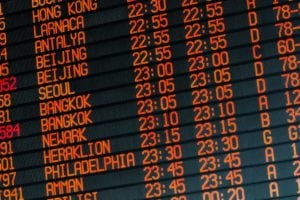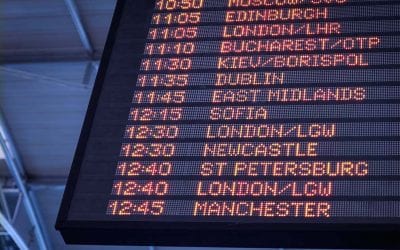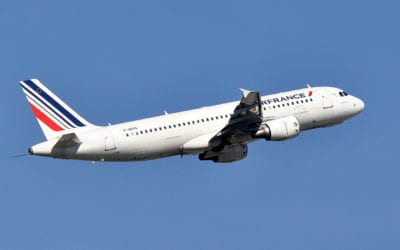When passengers cancel flights, they lose. Airlines win. With a nonrefundable ticket, that’s the inconvenient truth

If an airline cancels a flight or significantly changes the schedule, DOT rules govern the change or cancellation. When a passenger cancels a flight, they must follow the airline’s rules in the contract of carriage. Normally, if a passenger chooses to cancel their booking, they will be hit with extra fees and only receive an airline credit.
When the airline cancels a flight
Should the airline upon which a traveler plans to travel cancel the flight, the customer is in control. At this point, the airline must refund the full airfare plus any ancillary fees.
The passenger must ask the airline to provide a refund in cash. This means as a credit to a credit card, check, or cash, depending on how the payment to the airline was made. With a credit card credit, the refund should happen within seven business days. For other means of payment, the DOT rules provide 20 business days to refund the money.
When the airline “significantly” changes a scheduled flight

The significant schedule change comes with a notification that if a passenger does not choose to accept the airline change they can decline it. A passenger will then get a full refund. Several years ago this happened to me. I purchased a round-trip ticket to Barcelona from Washington, DC. It was on the Oneworld alliance. The flights were tickets on British Airways (BA) but I was flying on American Airlines (AA) planes. The change in the flight schedule modified my departure by 118 minutes. This is within BA’s definition of nonsignificant, however, it was well over the AA definition of 61 minutes.
To make matters worse, the ticket was purchased through a travel agent. The agent told me that I could not refuse the significant schedule change, according to the BA rules. However, I asked the travel agency to petition BA for their final ruling. I then provided the agency with the BA and AA contracts of carriage with the definitions of “significant” highlighted. The answer from BA — my airfare should be refunded in full because of the significant schedule change.
Airlines handle a significant schedule change as though it is an airline cancellation according to DOT’s regulations.
READ ALSO:
How to avoid passing out at 35,000 feet
Cash is king for COVID-19 airfare cancellation refunds
When passengers cancel flights, it will cost a lot of money
When a passenger cancels a nonrefundable flight, they are liable for the change. It is assumed that the change has been made at the passenger’s volition. Therefore, when passengers cancel flights, the cancellation fees come into play. They are normally between $200 and up to $450. The fee depends on whether the flights are domestic or international and how many connections are involved.
Normally, the passenger must pay a cancellation/change fee and then select a future flight. Sometimes, the airline will allow the passenger to keep the difference between the old airfare and the change fee as an airline credit. Sometimes, the airline refunds the difference by check or credit card credit.
Again, I note a personal experience
I have a ticket on Air France/KLM. I am planning on flying to Spain in July. At this time, no announcements have been made about fees or flight cancellations after May 31st. If I want to change the flights according to the normal contract of carriage rules, it costs almost the entire price of the ticket. These change/cancellation fees are not modified at this point.
- First, I would have to pay a $450 cancellation fee
- Next, I lose my seat reservation fees of $200
- Finally, I lose my checked-baggage fees of $120 for the round trip.
The total is $770. I only paid $875 for the original ticket. It is simply not worth changing my flight today. I am willing to wait until KLM cancels its scheduled flight or Air France cancels my return ticket. Or, the airlines may offer a significant schedule change. In either the cancellation scenario or the significant schedule change, I will more than likely be able to get a full refund. Time will tell.
The worst-case scenario is that I have a great trip to Europe after the pandemic has passed.
However, this example shows the unfriendly passenger calculations should the customer choose not to fly. These normal contract of carriage rules are in effect even when State Department warnings are at Level 4 or there is a shelter-in-place ruling at the passenger’s home.
For the European Union, EU261 compensation rules when passengers cancel flights
See Learn the EU’s passenger pandemic protection rules. The new delay and cancellation guidelines uphold the current strong EU rule. The EU passenger protections continue to be in effect. European airlines are still responsible for their passengers who are delayed during this crisis. They must provide meals and hotel rooms. And, airlines must provide cash refunds rather than vouchers for airline cancellations due to the pandemic.
According to IATA, there is some limited help in the newly-released EU passenger protection guidelines. The only exception is for national flight bans. Cancellations caused by flight bans and externally imposed measures will be considered an extraordinary circumstance (or force majeure). Canceling flights with a very low demand also qualifies as an extraordinary circumstance. In those cases, compensation for flight cancellations will not apply.

Charlie Leocha is the President of Travelers United. He has been working in Washington, DC, for the past 14 years with Congress, the Department of Transportation, and industry stakeholders on travel issues. He was the first consumer representative to the Advisory Committee for Aviation Consumer Protections appointed by the Secretary of Transportation from 2012 through 2018.



